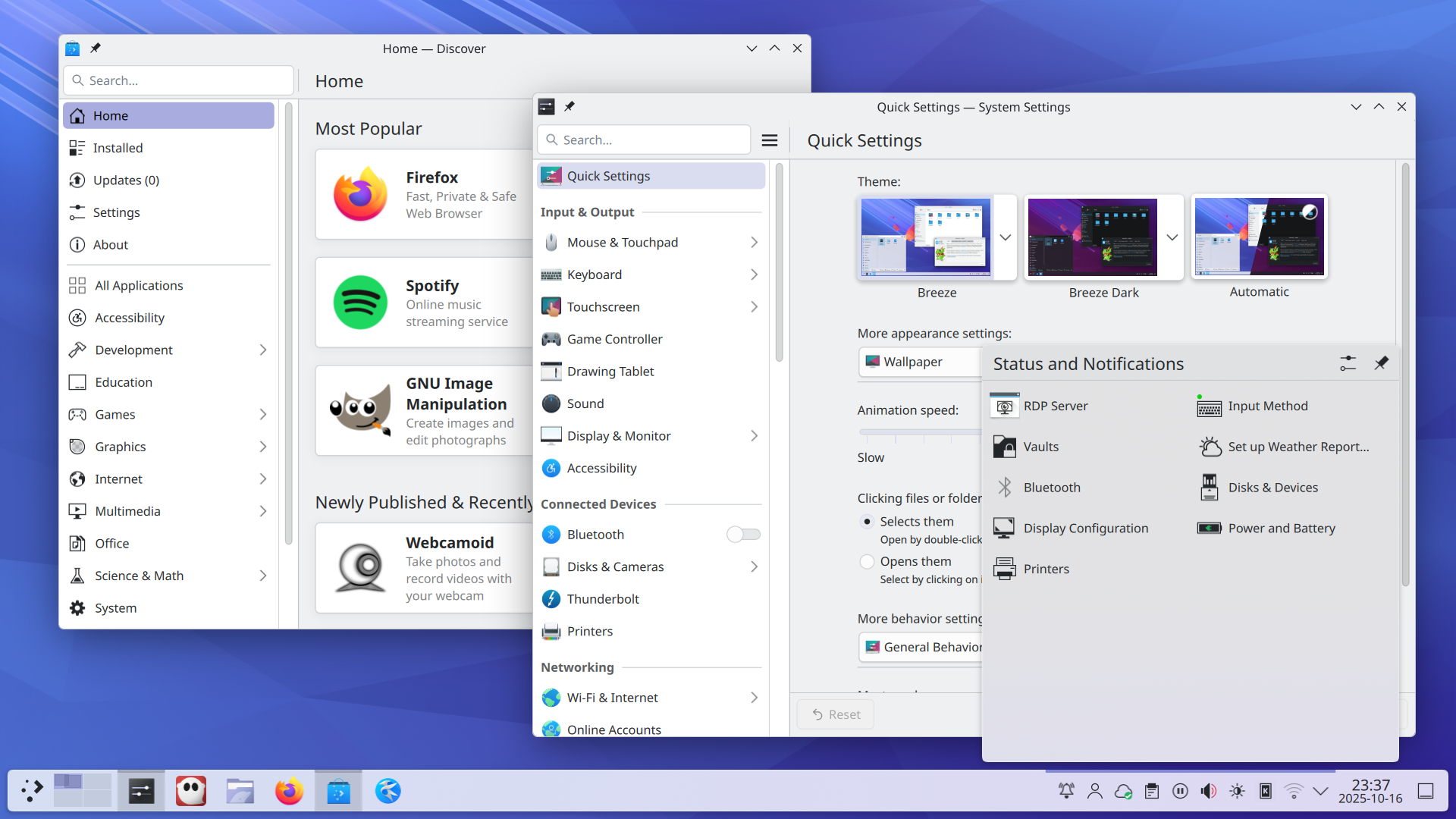Yeah I'm not sure I'd use it on the desktop either but for servers it is pretty good.I've been having a play with GhostBSD and there are way too many workarounds and compromises for me to be able to use it as a daily driver.
DRM for example means jumping through hoops just to watch catchup tv.
You are using an out of date browser. It may not display this or other websites correctly.
You should upgrade or use an alternative browser.
You should upgrade or use an alternative browser.
#Random Linux
- Thread starter Ice Tea
- Start date
More options
Thread starter's postsIntel's Open-Source Strategy Is Changing
https://www.phoronix.com/review/intel-open-source-2025
https://www.theregister.com/2025/10/09/intel_open_source_commitment/
This doesn't sound good: laying off engineers, engineers leaving, and more use of closed source libraries.
https://www.phoronix.com/review/intel-open-source-2025
https://www.theregister.com/2025/10/09/intel_open_source_commitment/
This doesn't sound good: laying off engineers, engineers leaving, and more use of closed source libraries.
Yet another has left.
With battlefield 6 being back Im back to dual booting specifically for that game. So I spent time getting secure boot working in cachyos. Once this is done I created a fish function called windows which firstly sets the windows boot choice in bootloader (limine) to be default choice then to reboot. So now from terminal I just type windows and boom reboot to windows. Then in windows in a scheduled task I mount the efi partition and set the boot loader choice back to linux so after a game i hit reset on tower or just reboot and back in cachy with very little need for any interaction. Next step is just make windows boot straight to battlefield 6.
Plasma 6.5 is up, along with a very nice new wallpaper. MacOS eat your heart out!


So I need to pick a light weight Linux bistro for only three tasks. It needs to run a firewall, SSH and KVM/QEMU and nothing else. Can anyone suggest a light weight Linux distro for those tasks please? Normally I'd either RHEL or Ubuntu LTS but curious if there is anything smaller.
So I need to pick a light weight Linux bistro for only three tasks. It needs to run a firewall, SSH and KVM/QEMU and nothing else. Can anyone suggest a light weight Linux distro for those tasks please? Normally I'd either RHEL or Ubuntu LTS but curious if there is anything smaller.
Literally any Distro - I prefer Debian for stability on these, expert install.
If size is super-important, Alpine. Or if you're willing to faff about a bit with QEMU, OpenBSD would be the amazing at this too.
Cool. Thank you. I'll have a play around. Was just curious as I wanted to keep the host machine as bare bones as possible.Literally any Distro - I prefer Debian for stability on these, expert install.
If size is super-important, Alpine. Or if you're willing to faff about a bit with QEMU, OpenBSD would be the amazing at this too.
I was going to say Alpine also, though learning to get along with musl instead of glibc can be a steep learning curve like the first time you use Arch.
Flatpaks work if you need a glibc applications but considering the size and extra overhead some people question if it's worth it on alpine as it's no longer a tiny os.
Flatpaks work if you need a glibc applications but considering the size and extra overhead some people question if it's worth it on alpine as it's no longer a tiny os.

Russian spies pack custom malware into hidden VMs on Windows
: Curly COMrades strike again
Russia's Curly COMrades is abusing Microsoft's Hyper-V hypervisor in compromised Windows machines to create a hidden Alpine Linux-based virtual machine that bypasses endpoint security tools, giving the spies long-term network access to snoop and deploy malware.
"This hidden environment, with its lightweight footprint (only 120MB disk space and 256MB memory), hosted their custom reverse shell, CurlyShell, and a reverse proxy, CurlCat," Bitdefender senior security researcher Victor Vrabie said in a Tuesday report.
WOW!, that's inventive.
systemd Lands Experimental Support For musl libc - Phoronix
Systemd today finally merged support for building against and using the musl libc library. This is a win for Linux distributions like postmarketOS, Alpine Linux, and others that use musl by default as their standard C library or offer it as an option.
Since September has been a pull request for experimental support for building systemd with musl libc. This requires a new version of musl with a recent patch, which has been backported to some distributions like Alpine Linux and postmarketOS, in order to use musl as an alternative to glibc.
So Alpine Linux may live on with Gnome desktop yet.

FreeBSD 15.0 vs. Ubuntu Linux For AMD EPYC Server Performance
@Throrik
Don't know if this is of any interest to you.
Red Hat has been trying to promote its AI-powered tools lately along with tools for developing new AI technologies. This pro-AI stance has spread into the Fedora distribution where it has resulted in debates and, this week, some amusingly poor results. This past week Fedora Magazine published a guide for setting up and using an AI tool for monitoring, troubleshooting, and managing the distribution: "By enabling an LLM direct access to system information and logs, it is transformed into an active part of the investigation process when troubleshooting an issue. It empowers an LLM to directly query the system state, allowing it to help identify performance bottlenecks, and identify important log entries that might be missed by a manual review."
The demonstration went poorly with the AI giving false information, incorrectly diagnosing a network issue, and repeatedly trying to get the user to run Debian's apt package manager instead of Fedora's own dnf tool.
LOL

Debusine Repositories Enter Beta: Ubuntu PPA-Like User Archives For Debian Linux
I've not looked at the mailing list or Debian forums to see if anyone is kicking off.
I am running Bazzite on my main PC and after a week its looking like I will stay on this full time, Unless CachyOS makes faster progress or I decide I want more power than the immutable OS set up offers.
My question is that Bazzite warns you over NTFS drives and the internet is full of "it works fine for me" and "its a time bomb dont do it". Well I dont plan to use any local NTFS drives. However my "NAS" is actually a windows 11 pc using shared folders so that I can access them with my microsoft login. I can login and access it just fine using SMB but since it is NTFS I dont want to risk any data on there. I dont know enough about any of this to know if it is translated or whatever the correct term is when accessed via the network or if using it from bazzite could corrupt it?
My question is that Bazzite warns you over NTFS drives and the internet is full of "it works fine for me" and "its a time bomb dont do it". Well I dont plan to use any local NTFS drives. However my "NAS" is actually a windows 11 pc using shared folders so that I can access them with my microsoft login. I can login and access it just fine using SMB but since it is NTFS I dont want to risk any data on there. I dont know enough about any of this to know if it is translated or whatever the correct term is when accessed via the network or if using it from bazzite could corrupt it?

